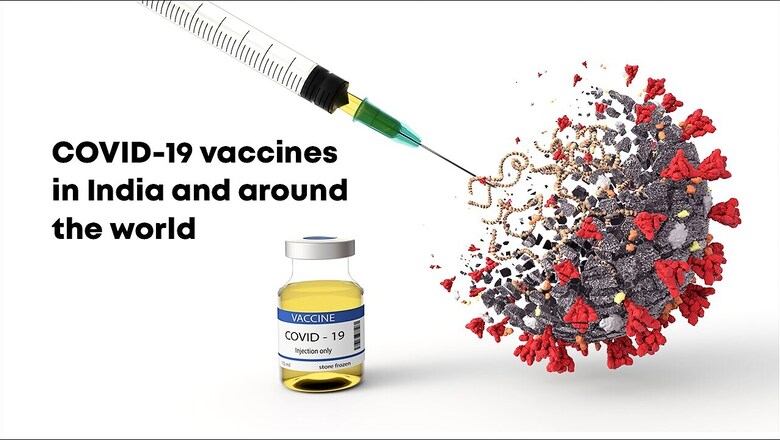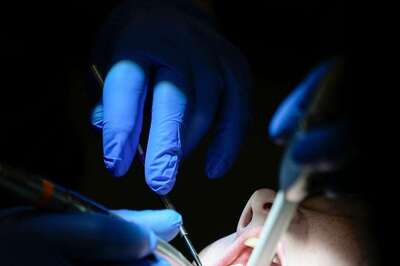
views
As India battles the second wave of the COVID-19 pandemic, vaccine supplies and rollouts are being increased across the country. 120,656,061 people have received the first dose of the vaccine while 4,41,23,192 people have received both doses, as of 28th May 2021. In India, two vaccines, Covaxin and Covidshield, were granted emergency use authorization by the Central Drugs Standard Control Organization (CDSCO) and are currently being administered to the masses.
Covaxin is an indigenously developed vaccine by Bharat Biotech in collaboration with the Indian Council of Medical Research (ICMR)- National Institute of Virology (NIV). It comprises inactivated coronaviruses that when injected into the body are recognized by the immune cells. This then triggers the immune system to make antibodies against the virus. In an interim analysis of Phase 3 of its clinical trial, Covaxin has demonstrated 78% efficacy against mild, moderate, and severe cases of the disease and 100% efficacy against severe COVID-19 disease with a reduction in hospitalizations. This vaccine is currently being administered as two doses given 4-6 weeks apart.
The other available vaccine, Covidshield, is an Oxford-AstraZeneca developed vaccine, manufactured locally by the Serum Institute of India. Being a viral vector vaccine, it uses a modified version of a different virus or the vector to pass on important information to body cells. Coronaviruses that cause COVID-19 have crown-like spikes on their surface called spike proteins. The vaccine enables the body to create copies of these spike proteins. As a result, the body will be able to recognize the virus and fight against it if it happens to get exposed to the disease at a later stage. Covidshield has an efficacy of 76% against symptomatic SARS-CoV-2 infection, 100% against severe or critical disease and hospitalization, and 85% against symptomatic COVID-19 in individuals aged 65 and above. The Ministry of Health and Family Welfare (MoHFW), Government of India recommends taking the vaccine as two doses paced 12-16 weeks apart from each other.
In April this year, Sputnik V, the Russian vaccine, was granted emergency use authorization and will soon be made available at vaccination centres in the country. Just like Covidshield, Sputnik V is also a viral vector vaccine and has demonstrated the efficacy of 91.6% against the coronavirus during late-stage trials. The Sputnik V has two doses that are given with a time interval of 21 days. However, unlike other vaccines, the two doses differ from each other slightly. Based on the premise that the use of two immunizations gives a more long-lasting and durable immune response and plays a role in long-term protection from the disease, each jab of the vaccine uses a different vector/inactivated virus. A single jab version of the vaccine called Sputnik Light is also under development.
Some of the vaccines available in other countries in the world include Pfizer, Moderna, Johnson & Johnson (Janssen), Sinopharm, CoronaVac, Novavac, etc. Pfizer and Moderna are mRNA-based vaccines, a new type of vaccine for prevention against infectious diseases. Instead of introducing a weakened or inactivated virus into the body, mRNA vaccines enable cells to make a protein or a piece of protein that activates the body’s immune response. If the body is exposed to the real virus, the immune response can produce antibodies to fight it. Pfizer is the only vaccine that is authorized for individuals from the age of 12. The Johnson & Johnson (Janssen) is a single dose viral vector vaccine while the Sinopharm and CoronaVac use inactivated virus.
While there are efficacy results from trial phases of vaccines, the actual effectiveness of each of these vaccines can only be determined over longer periods. According to the Ministry of Health and Family Welfare, India, when vaccines are given emergency use authorizations for restricted use, the trial follow-up is continued for 1-2 years to gauge the total duration of protection that the vaccine can provide. Vaccine efficacy is a measurement of a vaccine’s ability to protect against a disease in a vaccine trial. While evaluating COVID-19 vaccines, there is often a lot of emphasis on their efficacy against symptomatic disease. However, a more important factor to consider is the efficacy to protect against severe disease, hospitalization, and deaths.
Most of the vaccines have shown the efficacy of 70-90% against the benchmark of 50-60% efficacy set by global agencies and are, therefore, considered safe and effective for use. A comparison of vaccines must be done with caution as there are differences in the technology used and trial conditions under which each of these are tested. The World Health Organization and Centres for Disease Control and Prevention recommend taking the first vaccine available and refrain from comparing one over the other. With the possibility of a third wave of the pandemic, having majority of the people vaccinated rapidly is the need of the hour. Given the severity of the disease, any degree of protection against it will be helpful.
Type of vaccination
Pfizer
BNT162b2
Moderna
mRNA-1273
Oxford-AstraZeneca
AZD1222
Serum Institute of India (Covishield)
SKBio (Republic of Korea)
Johnson and Johnson (Janssen)
JNJ-78436735
No
*Still completing clinical trials
By Aishwarya Iyer, Coordinator, Community Investment, United Way Mumbai
Sources:
https://www.bbc.com/news/world-asia-india-55748124
https://www.thelancet.com/action/showPdf?pii=S0140-6736%2821%2900234-8
https://www.bmj.com/content/373/bmj.n969
https://www.bharatbiotech.com/images/covaxin/covaxin-factsheet1.pdf
https://vaccine.icmr.org.in/covid-19-vaccine
https://www.pfizer.com/news/hot-topics/the_facts_about_pfizer_and_biontech_s_covid_19_vaccine
https://extranet.who.int/pqweb/sites/default/files/documents/Status_COVID_VAX_28May2021.pdf
https://www.mohfw.gov.in/covid_vaccination/vaccination/faqs.html
https://www.cdc.gov/coronavirus/2019-ncov/vaccines/different-vaccines/Pfizer-BioNTech.html
https://www.cdc.gov/coronavirus/2019-ncov/vaccines/different-vaccines/Moderna.html
https://www.cdc.gov/coronavirus/2019-ncov/vaccines/different-vaccines/janssen.html
https://www.bharatbiotech.com/covaxin.html
https://www.who.int/news-room/feature-stories/detail/the-oxford-astrazeneca-covid-19-vaccine-what-you-need-to-know
https://www.thelancet.com/action/showPdf?pii=S0140-6736%2821%2900234-8
https://www.who.int/news/item/07-05-2021-who-lists-additional-covid-19-vaccine-for-emergency-use-and-issues-interim-policy-recommendations
https://www.mohfw.gov.in/pdf/CumulativeCovidVaccinationCoverageReport28thMay2021.pdf
https://www.astrazeneca.com/media-centre/press-releases/2021/azd1222-us-phase-iii-primary-analysis-confirms-safety-and-efficacy.html
https://www.afro.who.int/news/what-covid-19-vaccine-efficacy
https://www.yalemedicine.org/news/covid-19-vaccine-comparison
https://www.who.int/news-room/feature-stories/detail/the-sinopharm-covid-19-vaccine-what-you-need-to-know
Read all the Latest News, Breaking News and Coronavirus News here.


















Comments
0 comment